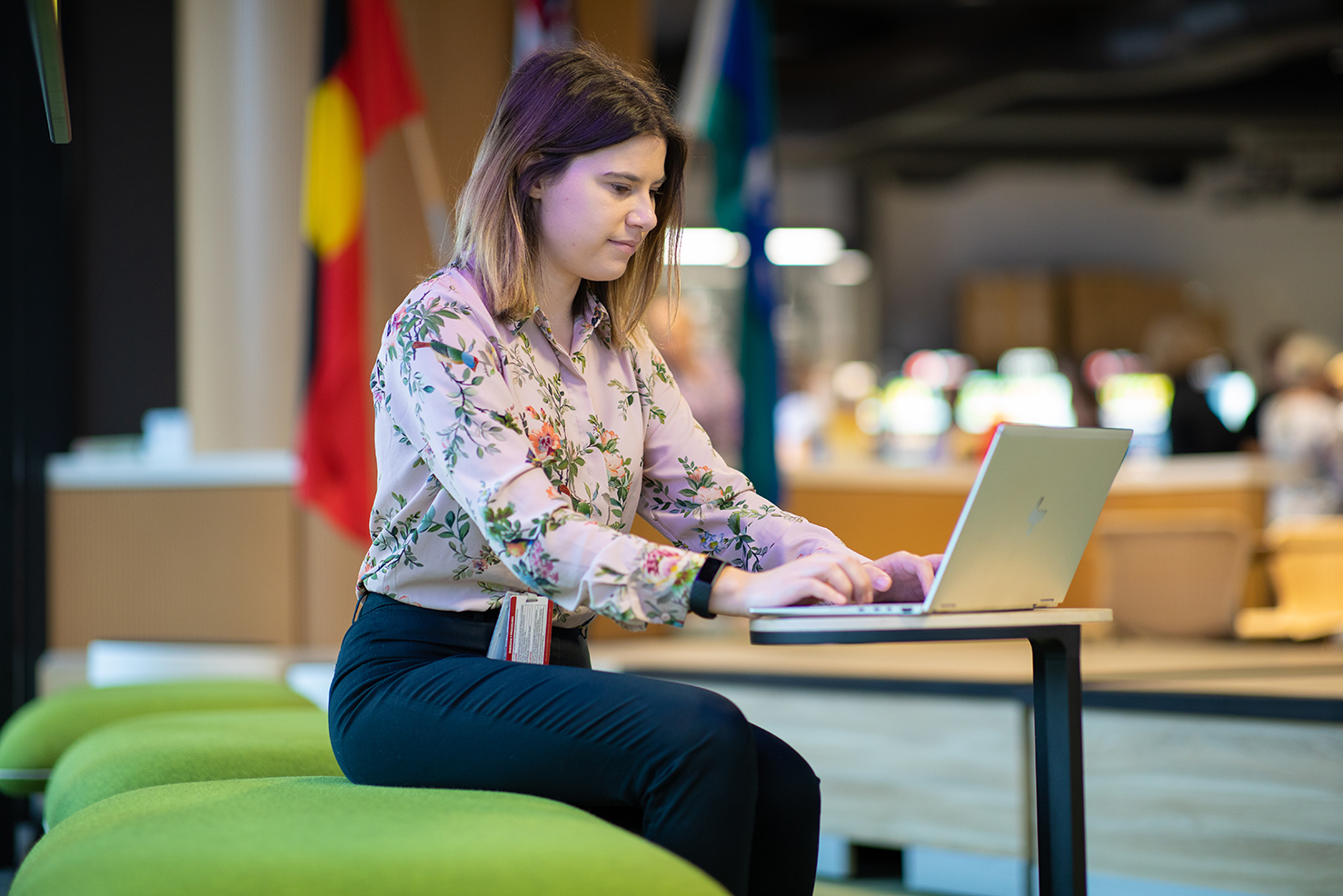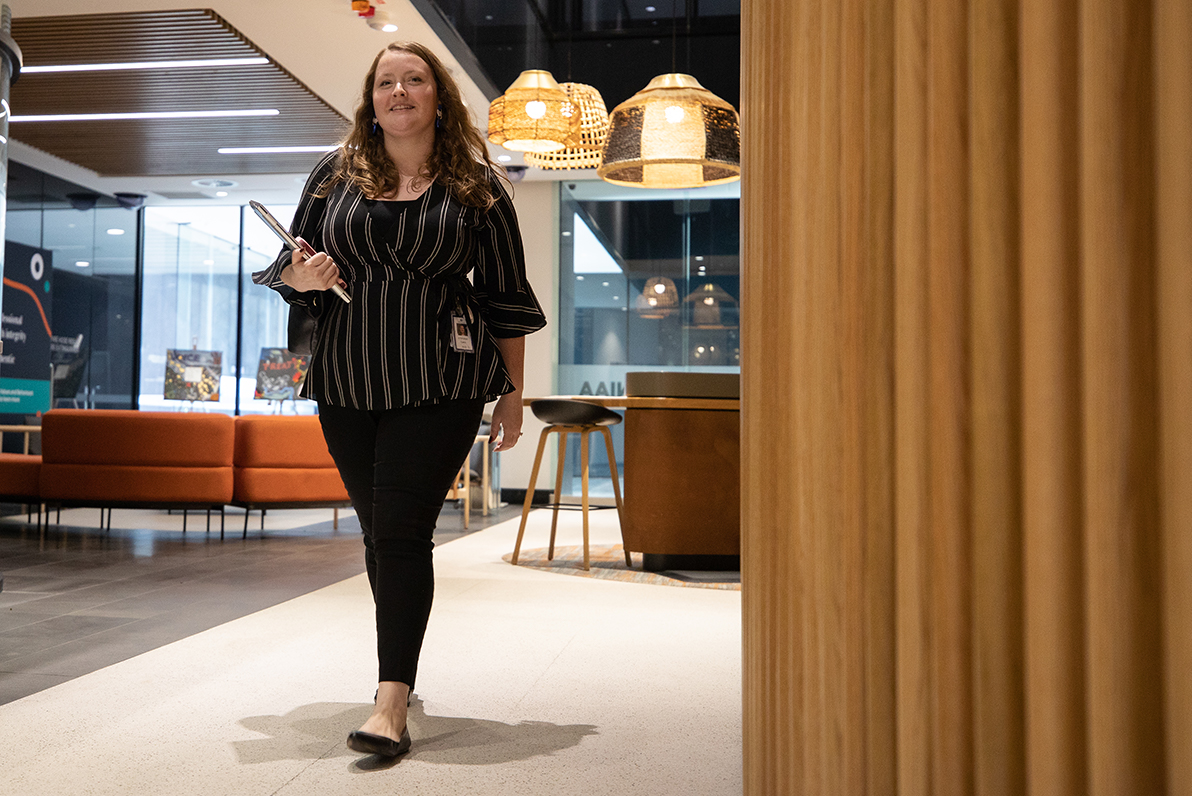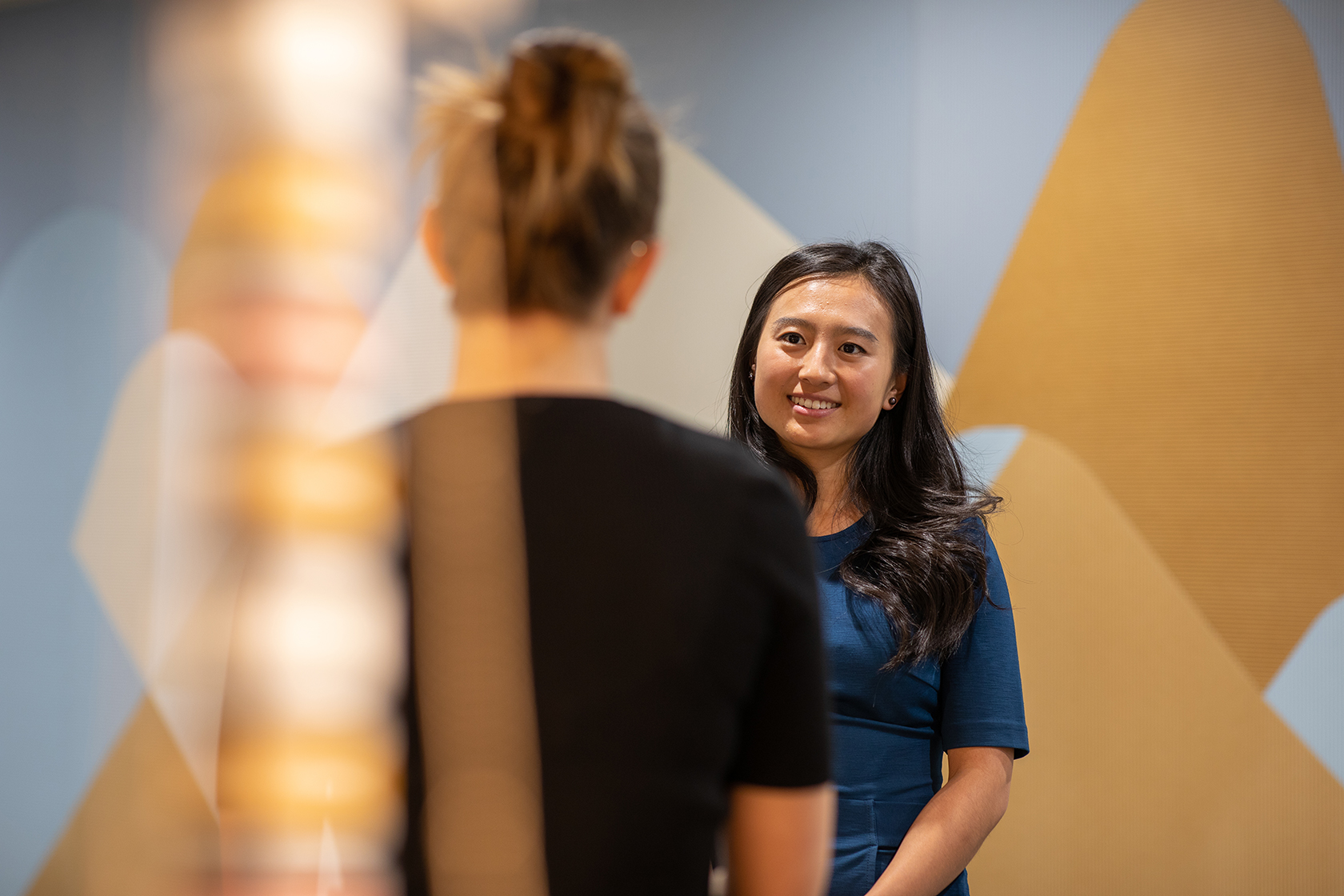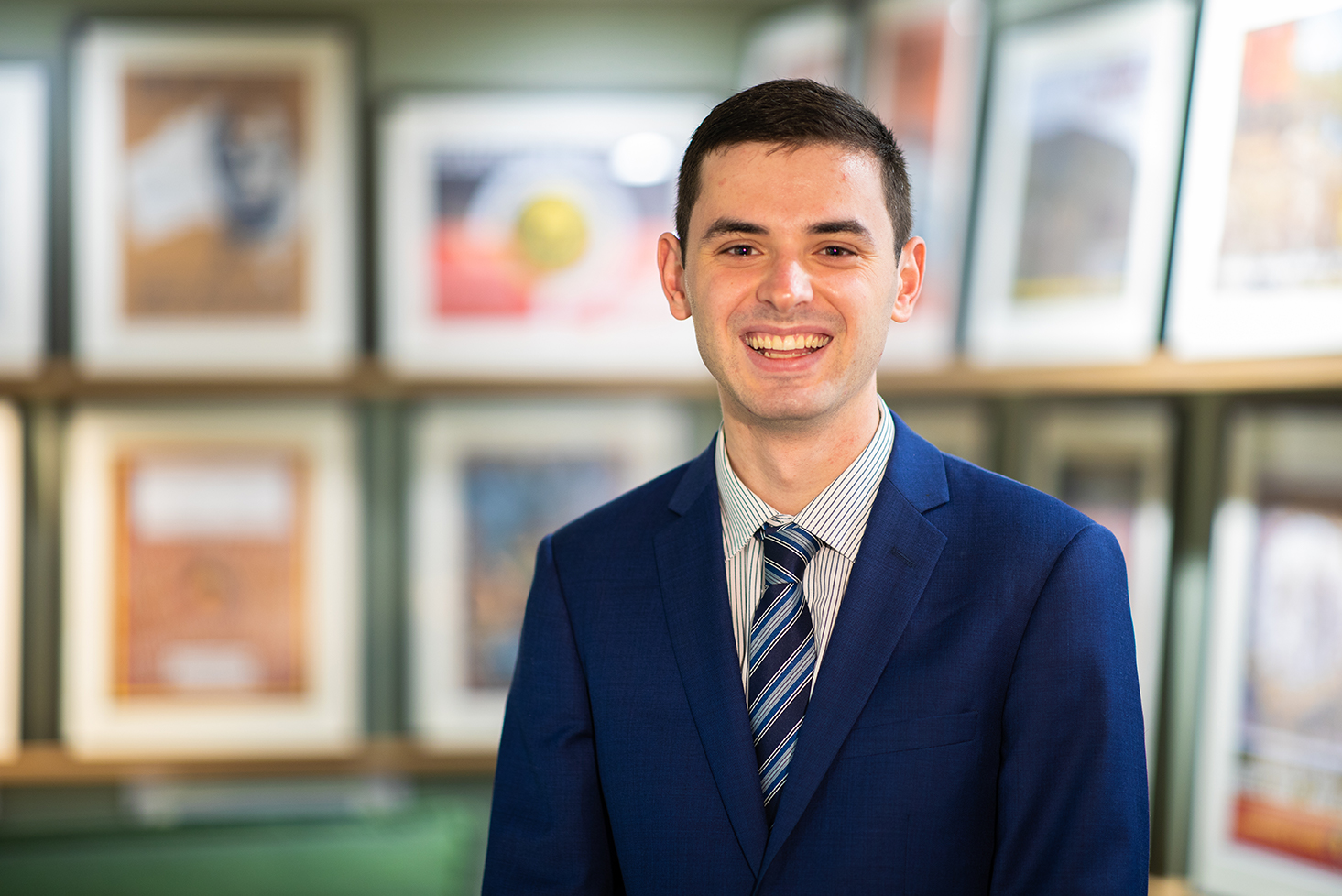
Amy Thomas NIAA Graduate
Advisor
Women's Safety Leadership Team
Australian National University
Bachelor of Arts
Graduated 2016
| Time | Activity |
|---|---|
| 6.00am |
This morning I’m waking up at Oak Valley, a remote Aboriginal community located on the southern fringe of The Great Victoria Desert, approximately 516kms northwest of Ceduna on Maralinga Tjarutja Lands. We made the 6-hour 4WD trip yesterday, contending with corrugated dirt roads, kangaroos and camels. We’re visiting to check in on the community activities the NIAA funds, and to talk to community members. |
| 7.00am | We head out on country with the Indigenous Rangers, and they show us some of their land management activities, including monitoring wildlife, fire management, and the upkeep of cultural sites. The Indigenous Rangers program provides employment to Aboriginal people, and makes use of their traditional knowledge to conserve, protect and manage their lands. |
| 11.00am | We return to Oak Valley and catch up with the Community Manager about some of the challenges the community is facing, and identify opportunities where the NIAA may be able to help. |
| 12.00pm | We eat lunch at a community barbecue, where we chat to community members and listen to their concerns. These informal meetings are vital to the NIAA’s work, as they allow us to build relationships, ensure the community’s needs are being met, and determine how we can improve our support. |
| 1.30pm | We head to the Oak Valley Anangu School to check on school attendance, which can often be a challenge in remote communities. |
| 2.30pm | We visit the Arts Centre, where we meet with some of the artists and view their work. The women’s art program is a Community Development Program activity, so we chat to the Coordinator about how the program is running, and hear about her plans for displaying the women’s art at exhibitions and galleries in Adelaide. |
| 3.30pm | We catch up with the Business Manager, who gives us an update on the Government-funded activities at Oak Valley. He tells us that Oak Valley has recently employed a new Youth Programme Coordinator. He started last week after a long search (it can be a challenge to find staff willing to relocate to remote communities), and is keen to work with Oak Valley’s young people. |
| 4.00pm | Continue my work on trade policy, it’s a dynamic space as we are refining policy in the midst of global contention about the global trading system and trade’s benefits. |
| 1.00pm | Catch up with the other grads in the café for lunch, before chatting to some colleagues from my last rotation in National Security Division. |
| 1.30pm | Discuss the work I am doing with my supervisor to make sure I am going in the correct direction. |
| 1.40pm | Jump into a private work nook to power through my work ahead of deadlines that afternoon. I have received feedback from a few other policy areas in the Department which need to be incorporated. |
| 3.30pm | Meeting of the Department’s Social Club preparing for some events later this month, we want PM&C to be a great place to work, but also have fun. This meeting is to plan a happy hour. |
| 4.00pm | We set up in the community office to perform some administration tasks, including checking emails and filling out observation reports on today’s activities. A phone tower was recently installed at Oak Valley, so we even have internet access! |
| 5.30pm | We return to our accommodation to make dinner and relax. I head outside to take in the glorious sunset and watch the stars come out. |

Stephanie Dakin NIAA Graduate
Advisor
Legal Services
Victoria University
Bachelor of Laws & Business
Graduated 2018
| Time | Activity |
|---|---|
| 7.00am |
Wake up and get ready for work. |
| 8.00am |
Leave home and drive to work. |
| 8.40am | I arrive at the office, collect my computer and headset from my locker, and set up my desk for the day. |
| 9.00am | After checking all my emails I head to the café downstairs with some of my colleagues to grab a coffee. |
| 9.20am | Update the day’s to-do list and continue working on the advice I started the day before. |
| 11.00am |
My Principal Lawyer asks me to research some legislation and provide advice on its application for their matter by close of business. |
| 12.30pm | Lunch is the delicious curry my partner made last night. I eat outside in the sunny Woden Town Square with some of my colleagues. |
| 1.30pm | I continue researching and contact a client to ask some clarifying questions about our instructions. I follow up the call with an email confirming what we discussed. |
| 2.30pm | I proof my draft advice from this morning before sending it to the Principal Lawyer for second counselling prior to it being sent to the client. As a Treasurer for the Social Club, I spend some time replying to emails in the Committee inbox and updating our financial spreadsheets. |
| 3.30pm | A Senior Lawyer and I meet with a client to discuss their matter. After the meeting, I decide I need a sugar boost for the afternoon and make a pit stop near our branch EA, where the Chief Lawyer puts out lollies and fruit. |
| 4.30pm |
I email my research to my Principal Lawyer and let them know I have capacity to help further on their matter if needed before moving on to the new matter I was allocated while on lunch. |
| 5.00pm | Drive home |
| 6.00pm |
Dinner. After dinner, I spend time with my partner and two cats. Usually this consists of watching Netflix or playing a video game together. |
| 10.30pm | I read a few chapters of my book then go to bed. |

Jennifer Li NIAA Graduate
Advisor
Compliance Operations
Australian National University
Bachelor of International Relations & Bachelor of Economics
Graduated 2017
On the Job with Jennifer from the National Indigenous Australian’s Agency
Jennifer Li is an adviser at the National Indigenous Australian’s Agency. She joined the Agency in 2019 as a graduate, after completing a Bachelor of Economic/Bachelor of International Relations from the Australian National University and an Honours in Government and International Relations from the University of Sydney.
Why the interest in NIAA?
NIAA works on a broad range of issues that affects First Nations Australians. I was interested in the range of work that the NIAA offers, as well as the opportunity to work in a Prime Minister and Cabinet portfolio agency.
How does the grad program work?
The NIAA works on a 12 month graduate program. I commenced on the program working in the Compliance Operations Section, and then completed a regional rotation in the Katherine Office of the Network.
Best aspects of the program thus far?
Being able to work in the network, seeing real-time impacts that Canberra policies have on lives was challenging, but also extremely eye opening.
NIAA graduates are also highly valued and provided with challenging work. During my time with the Agency thus far, I had worked in multiple different areas, including on the Incoming Government Brief. I have felt valued, challenged, but also supported during each of these roles.
What has been most challenging?
The most challenging part of the year to date has been learning how the Government works and how the work that we do fits into the whole picture. There are so many different areas whose work fits together to create policy.
Deciding where you want to go on your next rotation is also challenging. There are so many interesting areas with different opportunities!
The most surprising part?
The most surprising part is how much you can learn in a short amount of time, and how much I feel like I’ve made a contribution in the short time I’ve been in the NIAA.
What did you do between studying and full-time work?
I completed my thesis in November, and commenced full time work with the NIAA in February the following year. During the three months between university and work, I travelled around Europe.
Advice to current students?
Take opportunities, and believe in yourself. If you’re unsure, just give it a go! You never know where opportunities can take you, and how much you may enjoy something once you’ve tried it!
It’s also very important to believe in yourself, especially if you’re looking to work for the Public Service. It is so easy to think you’re not good enough, but Government looks for a wide variety of different skills – and you might not even know what you have to offer!

William Paparo - 2019 PM&C Graduate
Advisor
Central and East Arnhem Land
University of Western Australia
Master of International Relations
Graduated 2016
William Paparo is an adviser at the Department of Prime Minister and Cabinet. After joining as a graduate in 2019, he undertook a four-month rotation into the National Indigenous Australians Agency (NIAA) Arnhem Land and Groote Eylandt regional office in Nhulunbuy, Northern Territory. He graduated with a Bachelor of Arts (Honours) in 2017 and Master of International Relations in 2018, both from The University of Western Australia.
Why the NIAA Regional Network?
The NIAA Regional Network undertakes quite different work to the National Office in Canberra. While the National Office focuses on policy and program development, in the regional network we focus on the delivery and evaluation of programs. It gave me a 360-degree view of the policymaking process from the conceptual stage through to the evaluation stage after a program has been completed. It also provides an appreciation for the power of good policy – you can see the difference first hand in the communities we are here to serve.
How does the regional rotation work?
I am based in Nhulunbuy working in the East and Central Arnhem Land engagement team. We are responsible for engaging stakeholders and community members across diverse range of remote Aboriginal communities and homelands across an area roughly the size of Switzerland.
Throughout my rotation, my team have given me the opportunity to see every aspect of the team’s work. I have been doing a varied range of work from work in communities to undertake research projects, assisting in the management of grant funding and travelling with visiting delegations as they undertake their work across Arnhem Land.
I have also had the opportunity to work with my colleagues in the West Arnhem team based in Darwin and our Government Engagement Coordinators and Indigenous Engagement Officers based in community. Some of the best experiences I have had in this rotation have been working on the ground with our in-community colleagues who are intimately familiar with the people, places and cultural traditions of the community they live in.
Best aspects of the regional rotation thus far?
I had the opportunity to spend almost a fortnight in a community called Maningrida. While I had been to communities before Maningrida, it made a difference being able to spend a longer period there building relationships and getting a deeper understanding of the community. Being able to see below the surface, I could see the details of how fundamental Aboriginal culture is to remote communities and the everyday lives and challenges of people living in them.
What has been most challenging?
Living in a remote area has its challenges. Nhulunbuy is physically isolated. We are about 14 hours’ drive from Darwin and that road is impassable for a few months a year. In reality, flying is the only way in or out.
Things like easy access to shops and speciality foods that we take for granted in cities are hard to get out here and expensive if you can get them. I have found you also have to put in more effort to build a support network than you would in a city though it is a great way to meet people in your new temporary home.
However, the office here has made me feel very welcome and have done their best to make my transition to Nhulunbuy as smooth as possible. Being a small town, I cannot even go shopping without bumping into a colleague – they are always down for a chat inside or outside work!
The most surprising part?
The diversity of the communities in our region. Each one has different language groups, clans and dynamics. They are certainly not homogenous – each one has their own characteristics and, of course, their own stunning landscape as a backdrop! Over my time here, I have become familiar enough that I can adjust my style to reflect the different nature of each community to build the relationships we need to undertake our work.
Advice to current students?
Be open to new experiences! For someone with an international relations/economics background, working in the remote Northern Territory might not seem like an obvious decision on the surface. However, the experiences of working with people from all walks of life on some critical issues for remote communities has been so eye-opening and beneficial!






